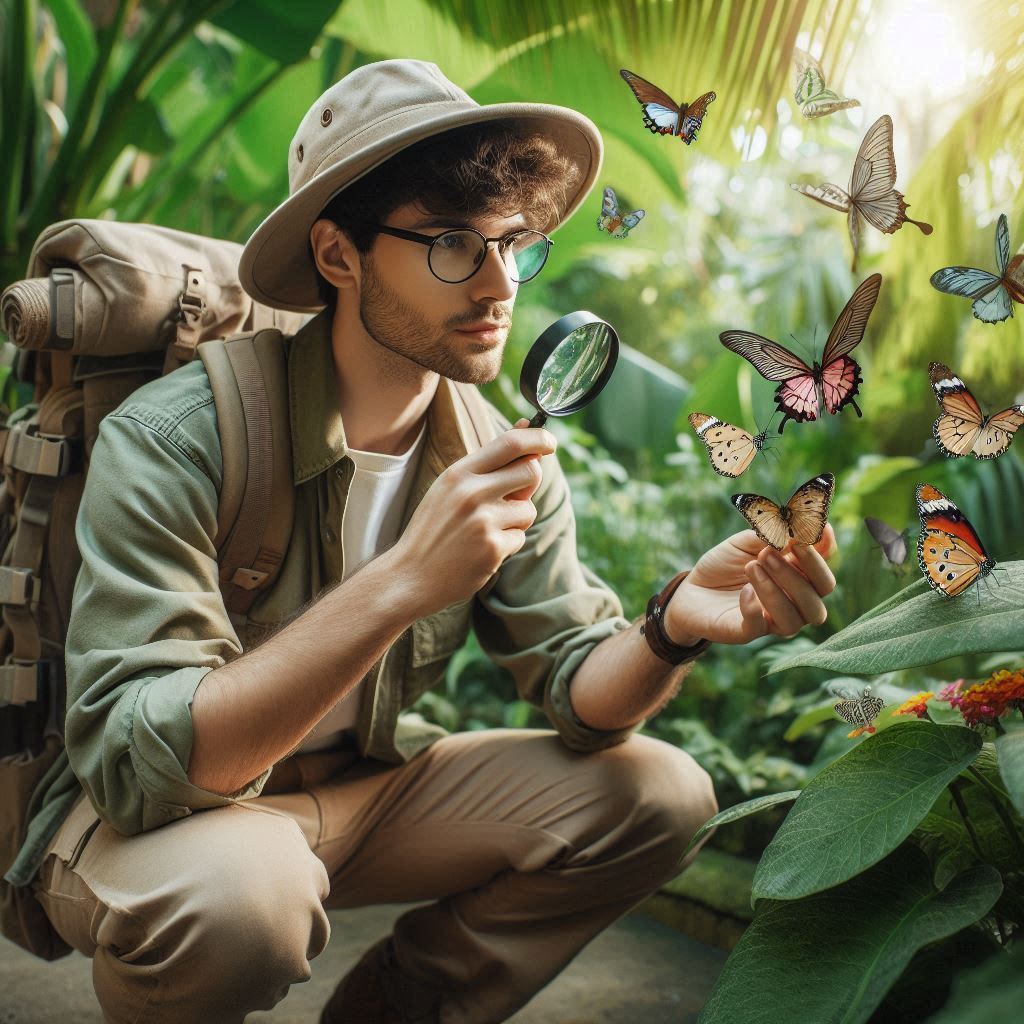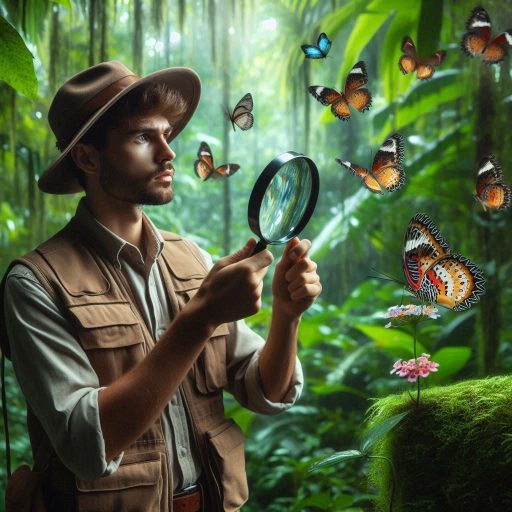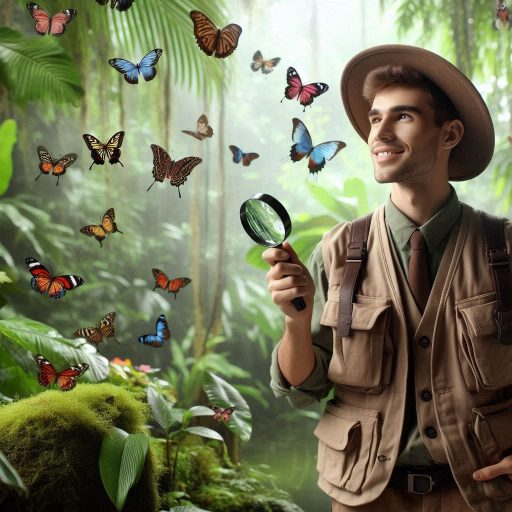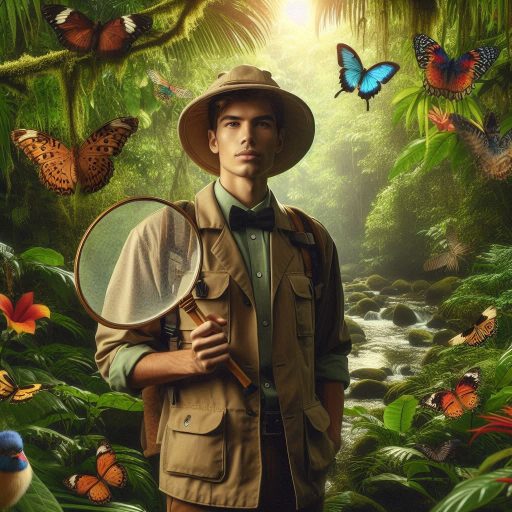Introduction
Field studies in zoology represent a cornerstone of wildlife research and conservation efforts.
They involve direct observation of animals in their natural habitats, allowing zoologists to gather invaluable data about behavior, reproduction, and interactions within ecosystems.
Unlike controlled laboratory settings, field studies provide a dynamic and unpredictable environment that reflects the realities of animal life.
This immersive experience is crucial for developing a comprehensive understanding of various species and their roles in the ecosystem.
The importance of field studies for zoologists cannot be overstated.
They foster critical thinking and adaptability, as researchers must respond to the unpredictable nature of wildlife behavior.
Field studies also allow zoologists to see firsthand the challenges animals face, such as habitat loss, climate change, and human interference.
This deeper understanding informs conservation strategies, helping to protect endangered species and preserve biodiversity.
This blog post will highlight memorable experiences from zoologists during their field studies.
Through these engaging stories, we will explore how these adventures shaped their understanding of wildlife and fueled their passion for conservation.
From thrilling encounters with elusive species to profound moments of connection with nature, each experience demonstrates the significance of fieldwork in the field of zoology.
Join us as we delve into the fascinating world of zoology, where field studies bring knowledge to life and inspire a commitment to protecting our planet‘s diverse ecosystems.
Importance of Field Studies
Why Field Studies Are Crucial for Zoologists
Field studies are vital for zoologists.
They provide hands-on experience in the natural environments where animals live.
This direct observation enhances understanding of animal behavior and habitats.
By studying animals in the wild, zoologists can gather data that laboratory settings cannot replicate.
These studies enable scientists to observe interactions, breeding habits, and feeding behaviors.
How Field Studies Help in Understanding Animal Behavior and Habitats
Understanding animal behavior is one of the primary benefits of field studies.
In their natural habitat, animals exhibit behaviors not seen in captivity.
Zoologists can observe social structures, mating rituals, and territorial disputes.
This knowledge is crucial for developing conservation strategies.
Effective conservation requires understanding how animals interact with their environment and each other.
Field studies also help zoologists understand habitats.
Different species thrive in specific environments, influencing their behavior and survival.
By studying these habitats, zoologists can identify essential resources and threats to animal populations.
They learn how environmental changes impact animals and ecosystems.
This information guides conservation efforts and habitat restoration projects.
The Practical Skills That Zoologists Develop Through Field Studies
Through field studies, zoologists develop essential practical skills.
They learn how to conduct surveys and collect data accurately.
They also practice various techniques, such as trapping, tagging, and tracking animals.
These skills are invaluable for their future work in conservation and research.
Field studies provide opportunities for teamwork and collaboration, essential in scientific research.
Additionally, fieldwork teaches problem-solving skills.
Zoologists often face unexpected challenges in the field.
They must adapt quickly to changing conditions and develop creative solutions.
This experience builds resilience and enhances their ability to think critically.
Such skills are transferable to various professional settings, making zoologists versatile.
Field studies also foster a deep appreciation for wildlife and the environment.
By witnessing animal behaviors firsthand, zoologists gain insights into their lives.
This connection fuels their passion for conservation and inspires others to protect wildlife.
Understanding animals in their natural context emphasizes the need for habitat preservation.
Moreover, field studies contribute to global knowledge.
They help gather data on endangered species and ecosystems at risk.
This research informs policy decisions and conservation initiatives worldwide.
By sharing findings with the scientific community, zoologists advance collective knowledge about biodiversity.
Field studies are essential for zoologists.
They deepen understanding of animal behavior and habitats.
Zoologists develop practical skills and foster a passion for conservation.
The impact of these studies extends beyond individual careers, benefiting global biodiversity efforts.
Emphasizing the importance of field studies can inspire future generations of zoologists.
Read: Educational Path: Becoming a Geologist in the USA
Unique Animal Encounters
Stories of Zoologists Coming Face-to-Face with Rare or Endangered Species
Zoologists often have extraordinary encounters with rare or endangered species during field studies.
For instance, Dr. Sarah Mitchell had a memorable experience while studying the critically endangered Amur leopard in the Russian Far East.
While quietly observing the forest, she spotted one perched on a branch, its spotted coat blending beautifully with the surroundings.
This moment filled her with both awe and a sense of urgency.
Witnessing such a rare animal in the wild reinforced the importance of their conservation.
In another instance, zoologist Dr. James Kim encountered the elusive mountain gorilla in Uganda.
While tracking the gorillas, he stumbled upon a group resting in a clearing.
The silverback, the dominant male, approached him curiously.
Dr. Kim felt an exhilarating mix of fear and admiration.
This close interaction highlighted the gorillas‘ intelligence and emotional depth.
Such experiences are rare and profoundly impactful, reminding zoologists of their responsibility to protect these magnificent creatures.
The Excitement and Awe Experienced During These Encounters
The excitement and awe experienced during these encounters are unparalleled.
Each moment spent with a rare species creates a lasting impression.
For many zoologists, these encounters become defining moments in their careers.
The thrill of seeing an endangered animal in its natural habitat can be transformative.
It ignites a deeper passion for wildlife conservation and fuels a desire to make a difference.
For instance, during her fieldwork in Madagascar, Dr.
Lisa Wong encountered the critically endangered aye-aye.
Spotting this unique lemur at night, she felt an overwhelming rush of excitement.
Observing its long fingers and curious behavior brought her closer to understanding its role in the ecosystem.
Such moments evoke a sense of connection to nature that is both humbling and inspiring.
The Role of Field Studies in Conservation Efforts
Field studies play a crucial role in conservation efforts by providing valuable data about endangered species.
Through direct observation, zoologists can assess population sizes, behaviors, and habitat needs.
This information helps guide effective conservation strategies and policies.
Moreover, these encounters often serve as powerful tools for advocacy.
When zoologists share their stories and experiences, they raise awareness about endangered species and their plight.
These personal narratives can inspire the public and policymakers to take action.
They highlight the urgency of conservation efforts and the need to protect fragile ecosystems.
Additionally, field studies help identify threats to wildlife, such as habitat loss and poaching.
By understanding these challenges firsthand, zoologists can collaborate with local communities to develop sustainable practices.
Engaging communities in conservation fosters a sense of stewardship and responsibility toward local wildlife.
Unique animal encounters profoundly impact zoologists and conservation efforts.
These experiences enhance understanding and appreciation of endangered species.
They inspire action and advocacy, highlighting the importance of field studies in safeguarding our planet‘s biodiversity.
Through these encounters, zoologists continue to make significant contributions to wildlife conservation.
Read: Botany Career Fairs and Networking Events
Challenging Field Conditions
The Hardships Zoologists Often Face During Field Studies
Zoologists often encounter numerous hardships during field studies.
Conducting research in remote locations can be both physically and mentally demanding.
The challenges faced in the field can test their resilience and adaptability.
From unpredictable weather to difficult logistics, these obstacles are part of the job.
However, overcoming these difficulties can enhance their understanding of wildlife and the ecosystems they inhabit.
Extreme Weather Conditions, Rugged Terrains, and Limited Resources
Extreme weather conditions are a common challenge for zoologists.
They may work in sweltering heat, freezing temperatures, or torrential rain.
For example, during a study in the Amazon rainforest, Dr.
Emily Rivera faced relentless humidity and heavy rainfall.
The weather often complicated her efforts to track animals and collect data.
Yet, these conditions also taught her valuable lessons about the rainforest ecosystem and the creatures that thrive within it.
Rugged terrains add another layer of difficulty.
Zoologists may traverse steep mountains, dense forests, or vast deserts.
Dr. Alex Turner encountered this while researching snow leopards in the Himalayas.
The challenging landscape made it hard to access certain areas, requiring careful planning and physical stamina.
Despite the exhaustion, the stunning views and unique wildlife made the effort worthwhile.
Limited resources also pose significant challenges in the field.
Zoologists often rely on basic equipment and supplies, which can be difficult to obtain in remote locations.
Field teams must be resourceful and creative in their approaches.
For instance, during a project on African elephants, Dr.
Maya Thompson improvised tracking methods using simple tools.
These constraints pushed her to think critically and develop innovative solutions.
How Overcoming These Challenges Adds to the Experience and Learning Process
Overcoming these challenges adds immense value to the field experience.
Each obstacle provides an opportunity for personal growth and professional development.
Zoologists learn to adapt quickly, think critically, and work collaboratively under pressure.
These skills are essential not only for their current research but also for their future careers in conservation.
Moreover, facing hardships often fosters a deeper connection to nature.
The experience of braving the elements and navigating difficult terrains creates lasting memories.
Zoologists often form strong bonds with their team members during these challenging times.
They share the highs and lows of their experiences, strengthening their resolve and commitment to their work.
Additionally, the insights gained from overcoming these challenges can lead to improved research methods.
Zoologists learn how to maximize limited resources and develop more efficient strategies for data collection.
This adaptability can enhance the quality and impact of their research.
Challenging field conditions are an inherent part of zoological research.
The hardships faced by zoologists‘such as extreme weather, rugged terrains, and limited resources‘test their resilience and resourcefulness.
Overcoming these challenges enriches their experiences and learning processes, ultimately making them better scientists and advocates for wildlife conservation.
Read: Preparing for a Botany PhD: Tips and Advice

Unexpected Discoveries
Examples of Zoologists Making Unexpected Discoveries During Field Studies
Unexpected discoveries often occur during field studies, leading to exciting new insights.
For instance, during a study of coastal dolphins, Dr. Rachel Anderson stumbled upon a previously unknown feeding behavior.
She observed dolphins using tools, such as marine sponges, to protect their snouts while foraging on the ocean floor.
This remarkable finding not only changed perceptions of dolphin intelligence but also sparked interest in tool use among marine mammals.
In another instance, zoologist Dr. Tom Edwards discovered a new species of frog while conducting a survey in a remote rainforest.
Initially searching for known species, he noticed a peculiar call that led him to a small, vibrant frog previously undocumented.
This discovery opened up new avenues for research on biodiversity in that region and highlighted the importance of preserving its habitat.
How These Discoveries Can Lead to New Research Opportunities
These unexpected discoveries can lead to exciting new research opportunities.
When zoologists identify novel behaviors or species, it prompts further investigation.
For example, Dr. Anderson‘s findings about the dolphins encouraged more in-depth studies into social learning and communication among marine mammals.
Researchers began exploring how these behaviors vary across different dolphin populations, enhancing our understanding of their social dynamics.
Similarly, the discovery of the new frog species by Dr.
Edwards led to collaborative research efforts.
Other scientists joined him in studying the frog’s habitat, reproductive habits, and ecological role.
Such discoveries can attract funding and resources, enabling researchers to expand their work and engage in broader conservation initiatives.
Moreover, unexpected findings can influence conservation strategies.
They highlight the need for continued monitoring and research in specific ecosystems.
For instance, the identification of the new frog species underscored the urgency of habitat preservation in the rainforest.
This discovery not only raised awareness about the species but also mobilized efforts to protect its environment.
The Importance of Staying Observant and Open-Minded in the Field
Staying observant and open-minded is crucial for making unexpected discoveries in the field.
Zoologists must be willing to adapt their research methods and question assumptions.
By being attentive to their surroundings, they can notice subtle behaviors or patterns that might otherwise go overlooked.
This attentiveness often leads to breakthrough findings that can reshape scientific understanding.
An open-minded approach encourages curiosity and creativity.
When zoologists remain receptive to new ideas and experiences, they can connect seemingly unrelated observations.
This ability to synthesize information fosters innovative thinking and can inspire new research questions.
Moreover, unexpected discoveries often arise from collaboration with local communities.
Engaging with local knowledge holders allows zoologists to gain insights about species and behaviors that may not be documented in scientific literature.
By valuing this knowledge, researchers can enhance their studies and discover new avenues for exploration.
Unexpected discoveries in zoological field studies are essential for advancing science.
Examples of groundbreaking findings demonstrate the potential for new research opportunities.
Staying observant and open-minded in the field allows zoologists to uncover hidden insights and drive meaningful conservation efforts.
Embracing the unexpected enriches their work and contributes to a deeper understanding of the natural world.
Read: Interdisciplinary Research: Botany and Other Sciences
Bonding with Nature
The Connection Zoologists Feel with Nature During Field Studies
Zoologists often develop a profound connection with nature during field studies.
Immersed in the natural world, they experience firsthand the intricate relationships between species and their environments.
This deepening connection allows them to appreciate the beauty and complexity of ecosystems.
For many zoologists, these moments in the field become transformative experiences that shape their understanding of wildlife.
While observing animals in their habitats, zoologists witness behaviors and interactions that reveal the essence of life.
This closeness to nature fosters a sense of responsibility to protect it.
For example, when studying elephants in the savannah, zoologist Dr.
Anika Patel felt a strong bond with the herd.
Observing their social dynamics and nurturing behaviors reminded her of the importance of familial connections in all species.
Moments of Tranquility and Appreciation for the Environment
Field studies often provide moments of tranquility that deepen zoologists’ appreciation for their surroundings.
Early mornings in the field can be serene, with the sun rising over the horizon and wildlife stirring.
Dr. Leo Zhang often reflects on his quiet mornings in the African bush, where the stillness allows him to listen to the sounds of nature.
This tranquility creates a peaceful atmosphere that encourages contemplation and connection to the environment.
While studying birds in the Amazon rainforest, zoologist Dr. Clara Thompson experienced a moment of pure joy.
Sitting quietly in a canopy tower, she watched colorful toucans and macaws flit about the trees.
These serene moments allow zoologists to recharge and appreciate the beauty of nature.
Such experiences remind them of the importance of conserving these habitats for future generations.
How These Experiences Deepen a Zoologist’s Passion for Conservation
These intimate experiences in nature significantly deepen a zoologist’s passion for conservation.
Witnessing the wonders of wildlife firsthand ignites a commitment to protecting vulnerable species and their ecosystems.
For many zoologists, the moments spent in the field serve as powerful motivators for their conservation efforts.
Dr. Patel‘s connection to the elephants she studied inspired her to advocate for anti-poaching initiatives.
The emotional bond she formed with these majestic creatures fueled her determination to make a difference.
Similarly, Dr. Thompson‘s encounters with rare bird species emphasized the urgent need for habitat preservation.
Moreover, these experiences highlight the interconnectedness of life.
Zoologists understand that every species plays a vital role in maintaining ecological balance.
This awareness drives their commitment to conservation and sustainable practices.
By fostering a sense of stewardship, they work tirelessly to educate others about the importance of protecting wildlife and natural habitats.
Bonding with nature during field studies profoundly impacts zoologists.
The connection they feel deepens their appreciation for the environment and enhances their commitment to conservation.
Moments of tranquility allow them to reflect on their experiences and renew their passion for protecting the natural world.
Through these intimate connections, zoologists become powerful advocates for wildlife conservation, inspiring others to join in their efforts.
Transform Your Career Today
Unlock a personalized career strategy that drives real results. Get tailored advice and a roadmap designed just for you.
Start NowExplore Further: Biomedical Engineering: Innovations in Rehabilitation
Explore Further: Famous Seismologists and Their Contributions
Collaborative Fieldwork
The Collaborative Nature of Field Studies in Zoology
Field studies in zoology often rely on collaboration to achieve research goals.
Teamwork allows zoologists to pool their expertise, resources, and insights.
Collaborative efforts lead to more comprehensive data collection and analysis.
They also foster innovative problem-solving approaches to complex ecological issues.
Working together, researchers can share responsibilities and enhance the efficiency of their studies.
Collaboration is particularly vital when studying wildlife in remote areas.
Accessing difficult terrains often requires diverse skill sets and knowledge.
Zoologists often partner with local experts who understand the land and its ecosystems.
This collaboration bridges gaps in knowledge and enhances research effectiveness.
Stories of Zoologists Working Together with Local Communities or Other Researchers
One notable example of collaboration occurred during a study of orangutans in Borneo.
Dr. Maria Gomez and her team worked closely with local indigenous communities.
The locals shared valuable insights about orangutan behavior and habitat.
They provided guidance on traditional conservation practices that had preserved these forests for generations.
In another case, Dr. Kevin Li led a team of researchers studying migratory birds along the Pacific Flyway.
He collaborated with ornithologists from several institutions and local birdwatching groups.
Together, they organized field days to engage the community in bird monitoring efforts.
The collaboration not only improved data collection but also raised awareness about the importance of protecting migratory routes.
How Teamwork Enhances the Overall Experience and Research Outcomes
Teamwork significantly enhances the overall experience and research outcomes in zoological field studies.
Collaborating with others fosters a sense of camaraderie and shared purpose.
This connection motivates researchers to work diligently toward common goals.
For instance, during a project studying sea turtles, the close-knit team celebrated their findings together, reinforcing their commitment to conservation.
Moreover, collaboration allows for the exchange of ideas and methodologies.
Each team member brings unique perspectives, enriching the research process.
For example, when studying desert wildlife, Dr.
Sarah Patel incorporated knowledge from ecologists, biologists, and local conservationists.
This multidisciplinary approach led to a more holistic understanding of the ecosystem and its challenges.
Collaboration also enhances the impact of research.
By involving local communities, zoologists can foster stewardship and support for conservation efforts.
Engaging the community encourages them to take an active role in protecting their environment.
As a result, research outcomes can lead to sustainable practices that benefit both wildlife and local populations.
Collaborative fieldwork is essential in zoology.
Working together with local communities and fellow researchers enriches the research experience.
These partnerships lead to more effective data collection and analysis, ultimately enhancing conservation efforts.
The shared passion and dedication within collaborative teams create a strong foundation for impactful research, inspiring future generations of conservationists.
See Related Content: Materials Scientist: Impact on Renewable Energy Solutions
You Might Also Like: Ethics in Marine Biology Research
Personal Growth
The Personal Growth That Zoologists Experience Through Field Studies
Field studies offer zoologists profound opportunities for personal growth.
Immersed in nature, they confront various challenges that test their skills and character.
These experiences often foster a deeper understanding of themselves and their motivations.
Through field studies, zoologists learn valuable lessons about perseverance, teamwork, and empathy.
Working in unpredictable environments pushes zoologists beyond their comfort zones.
They develop a strong sense of purpose as they work to protect wildlife and their habitats.
This commitment fuels their passion and drives them to make meaningful contributions to conservation efforts.
The Development of Resilience, Adaptability, and Problem-Solving Skills
One significant aspect of personal growth in field studies is the development of resilience.
Zoologists often face unexpected challenges, from harsh weather conditions to equipment failures.
Adapting to these situations enhances their problem-solving skills and mental fortitude.
For example, during a study on migratory birds, Dr.
Maya Lopez encountered equipment malfunctions in the field.
Instead of giving up, she improvised using local materials to repair her gear.
This experience taught her the importance of staying calm and resourceful under pressure.
Adaptability is another critical skill developed through fieldwork.
Zoologists must adjust their research methods based on changing circumstances.
They learn to think on their feet and adapt to new information or conditions.
For instance, Dr. Samuel Green was studying a population of wolves when an unseasonable storm disrupted their movements.
He quickly adjusted his study plans to focus on alternative habitats, leading to unexpected insights into wolf behavior.
Anecdotes of Zoologists Overcoming Obstacles and Learning from Their Experiences
Many zoologists have memorable anecdotes about overcoming obstacles during field studies.
One such story involves Dr. Emily Wang, who studied coral reef ecosystems.
While conducting research in a remote location, she faced sudden equipment failure, jeopardizing her data collection.
Instead of succumbing to frustration, she gathered her team to brainstorm solutions.
They used creative techniques to collect data manually, which led to unique findings about coral resilience.
This experience reinforced her belief in the power of teamwork and innovation.
Another inspiring anecdote comes from Dr.
Rahul Mehta, who worked on a conservation project in a challenging environment.
He faced logistical difficulties due to remote locations and limited resources.
Instead of allowing these obstacles to deter him, he engaged with local communities.
By leveraging their knowledge and resources, he developed effective strategies to gather data and implement conservation initiatives.
This collaboration not only enriched his research but also built lasting relationships with local residents.
Personal growth is a vital outcome of field studies for zoologists.
Through resilience, adaptability, and problem-solving, they navigate challenges that shape their character and career.
Anecdotes of overcoming obstacles illustrate the transformative nature of these experiences.
Ultimately, field studies not only contribute to scientific knowledge but also foster the personal development of dedicated zoologists.
Discover More: Seismology Tools: Instruments Used in Earthquake Research
Uncover the Details: Forensic Toxicology: What You Need to Know
Delve into the Subject: Marine Biology Career Paths and Options
Conclusion
Field studies play a crucial role in zoology, offering insights that textbooks cannot provide.
They allow zoologists to observe animal behavior and interactions in their natural habitats.
These experiences deepen understanding and enhance the study of wildlife.
By stepping into the field, researchers can witness firsthand the intricacies of ecosystems and the dynamics between species.
Aspiring zoologists should actively seek out fieldwork opportunities.
Engaging in hands-on research fosters valuable skills and practical knowledge that classroom settings cannot replicate.
Such experiences can ignite a lifelong passion for wildlife conservation and inspire individuals to advocate for the environment.
Field studies create lasting memories and connections with nature.
They provide unique challenges and triumphs that shape dedicated professionals.
The moments spent observing animals in their natural habitats often lead to unexpected discoveries.
Such firsthand experiences enrich both personal and professional growth, instilling a sense of responsibility toward conservation.
Ultimately, pursuing fieldwork is essential for anyone serious about zoology.
It allows aspiring zoologists to apply their knowledge and enhance their understanding of wildlife.
Embrace the journey; it will shape your future and fuel your dedication to protecting our planet‘s diverse species.
[E-Books for Sale]
The Big Book of 500 High-Paying Jobs in America: Unlock Your Earning Potential
$19.99 • 500 High-Paying Jobs • 330 pages
Explore 500 high-paying jobs in America and learn how to boost your career, earn more, and achieve success!
See All 500 High-Paying Jobs of this E-Book
1001 Professions Without a Degree: High-Paying American Jobs You Can Start Now
$19.99 • 1001 Professions Without a Degree • 174 pages
Discover 1001 high-paying jobs without a degree! Unlock career tips, skills, and success strategies for just $19.99!




